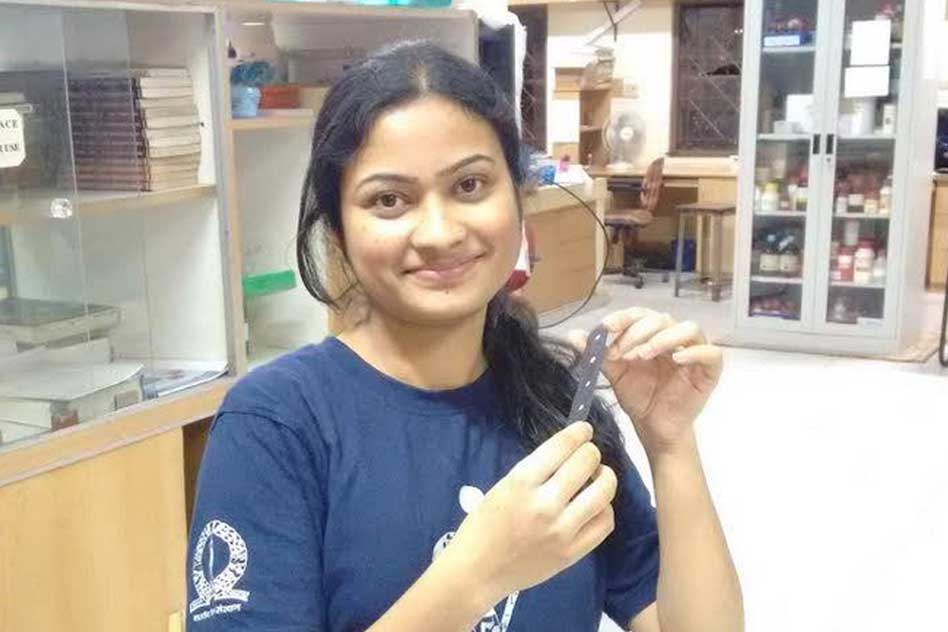
IISc Researchers Develop Methods To Detect Heart And Liver Problems With A Paper
10 Jan 2017 6:33 AM GMT
A first-of-its-kind paper biosensor has been developed by a group of researchers at the Indian Institute of Science, Bangalore to serve as a novel, inexpensive device to detect the presence of various enzymes including lipase, excess of which is responsible for several cardiac and liver related diseases.
The research group, comprising Prof. Uday Maitra and his Ph.D. student Ms. Tumpa Gorai from the Dept. of Organic Chemistry, IISc, has calculated the material cost of fabrication to be less than Rs. 1 per device. The Logical Indian recently interviewed Ms. Tumpa Gorai about her research experience, and the excerpt is as follows.
TLI: What was the motivation for your research?
India being a developing country there is a lack of resource, infrastructure and trained personnel in most places. The motivation for my research was to find out a user-friendly and low-cost approach towards biologically important enzyme assay.
TLI: What are biosensors and paper-based biosensors?
Biosensors are devices for the detection of biological molecules where the interaction of such molecules with the sensor generates a measurable signal (e.g. electrical or light). Low cost, easy availability, biocompatibility and biodegradability make paper an attractive choice for sensor design.
TLI: Could you give us a brief description of your research?
Enzymes in our body are crucial for maintaining proper metabolic functions. In this work, we have developed a user-friendly approach for the detection of several enzymes, including beta-glucosidase and lipase. The detection is done using a small (5 mm dia) paper disc coated with a Terbium (a rare earth metal) based gel doped with a specially designed synthetic substrate for the specific enzyme. The addition of the specific enzyme to the coated disc generates green emission upon illumination with readily available long-wave UV lamps, thereby providing an easy method to detect the enzyme.
TLI: How is your method of enzyme detection advantageous over existing methods?
This approach of enzyme detection costs very little and needs low volumes of samples for analysis. As a proof-of-principle concept we have shown that our system can detect enzymes in some of the real samples such as almond extract (beta-glucosidase) and blood serum (lipase).
TLI: What are the future prospects of this assay method?
A much more detailed understanding and improvement on the paper-based sensor system is required and research based on this is currently going on in our laboratory. We believe that in the future this strategy can be used with a simple, hand-held device for measuring enzyme levels in clinical samples.
TLI: What do you think of the research atmosphere of IISc and India, in general? Did you face any challenges?
The research atmosphere in India is getting better with time. IISc being a premier research institute in the country has excellent facilities. Yes, we did face some difficulties, and had to sort them out with creative solutions.
TLI: What is your opinion about India’s research spending and inclination towards science? Do you have any suggestions regarding how research and scientific temperament can be improved in India?
Already many initiatives have been taken by various agencies to develop interest in science among school children by arranging science fairs, visits to science institutions, workshops, etc. Even in IISc we have our own “Open Day” in the first week of March every year and it attracts many students from various age groups as well as common people who wish to gain knowledge about ongoing research in the campus. More and more events like this will not only create a much deeper interest in science among the young generation but also will help bridge the gap with the old generation.
TLI: What motivated you to pursue research and choose Organic Chemistry as your field?
An inquisitiveness to get a deeper understanding about how things function motivated me to pursue research.
Everything surrounding us is made up of atoms, the basic building block. How the atoms interact with each other to make a molecule and why a molecule shows various interesting biological, electronic, magnetic and optical properties always intrigued me. Hence an interest was developed in applied organic chemistry.
TLI: How do you think youngsters can be motivated to pursue research in India?
If we can spread the message about why we need to do research, the youngsters will definitely be motivated to pursue research.
 All section
All section













